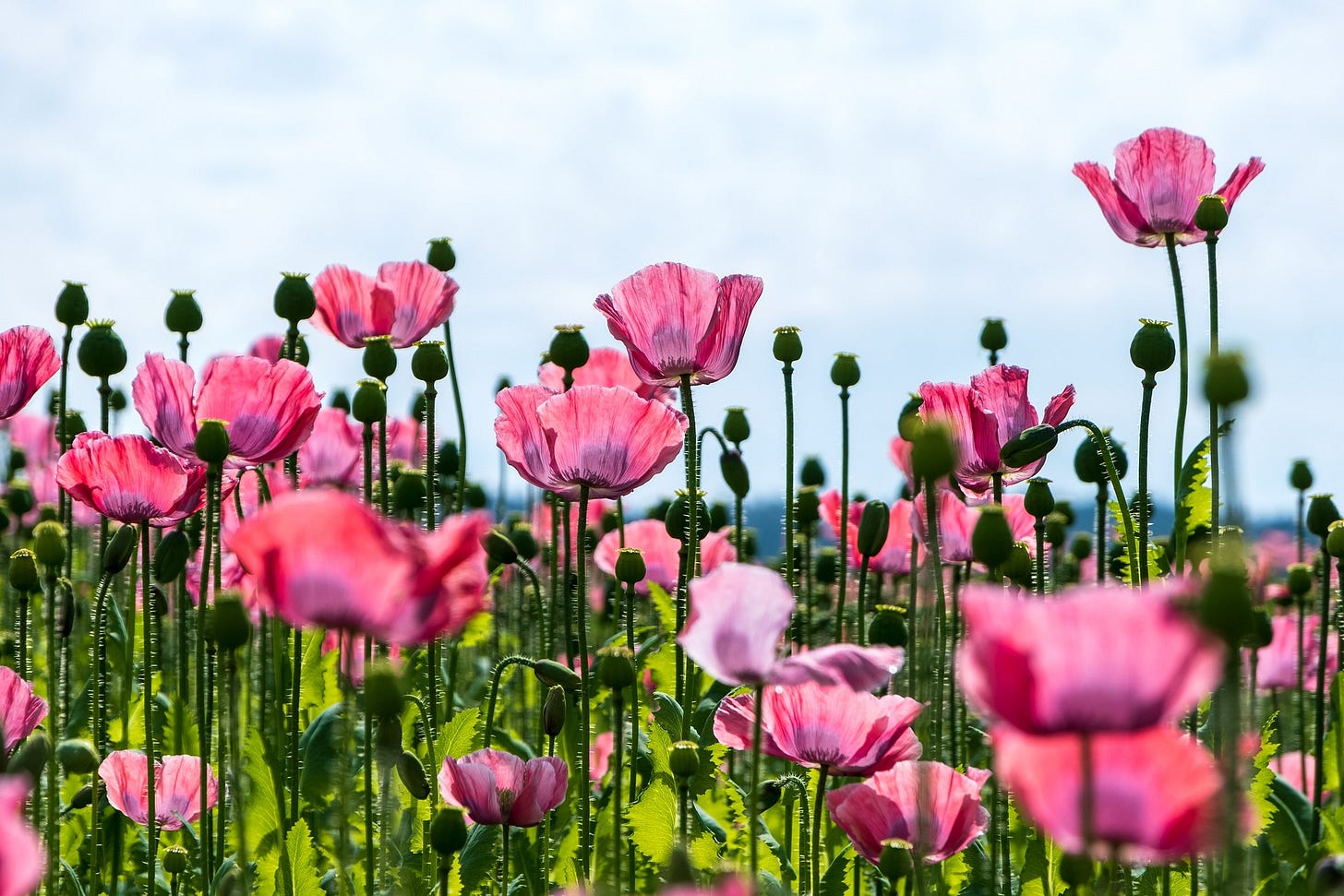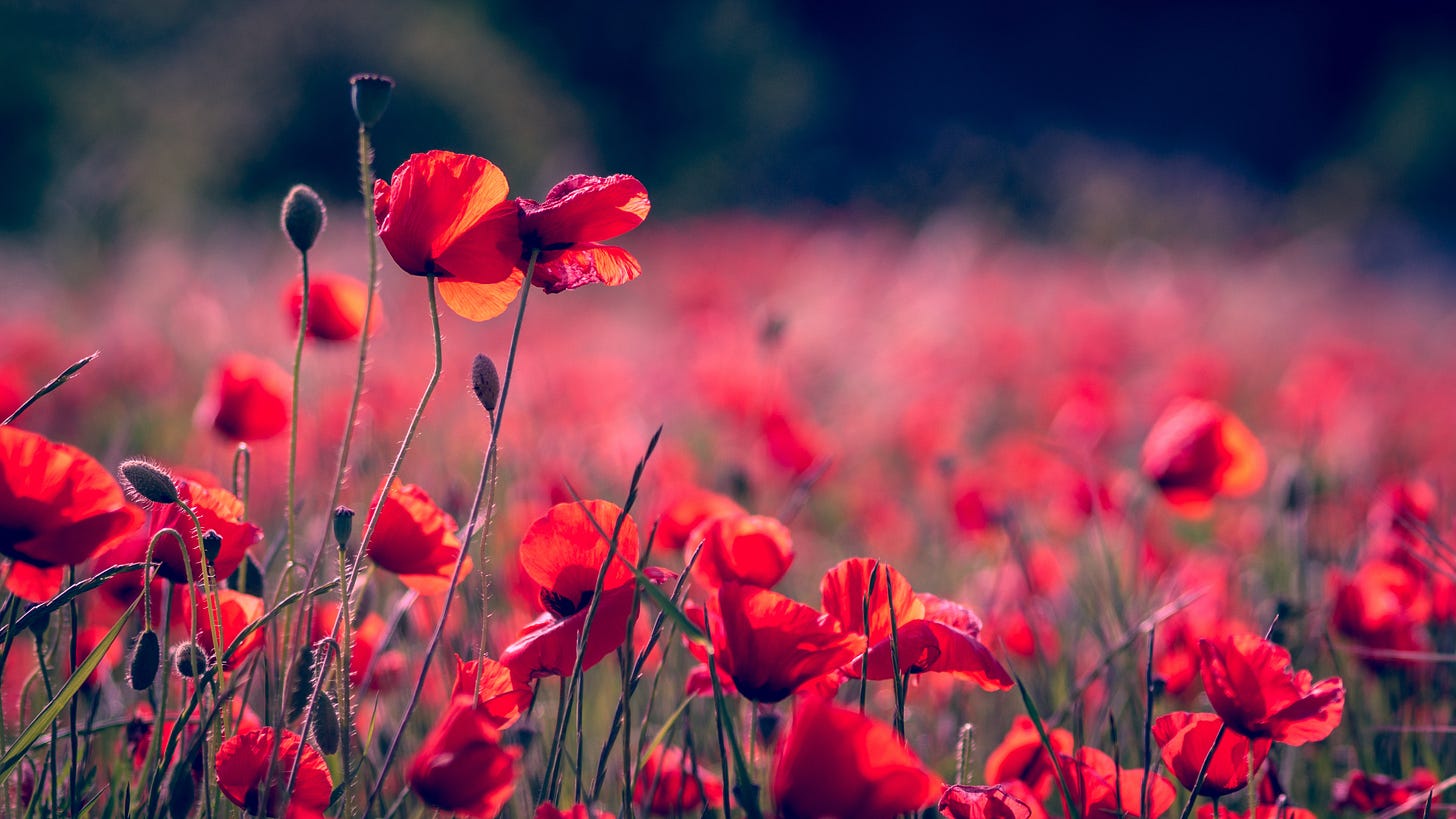Today I want to write about two substances that are uncommon in our region, but cause considerable trouble in many parts of the world. We do like the nourishing seeds of their beautiful, mystical source plant, though. And the events in society connected to these drugs are quite intriquing and instructive.
I have some minimal personal experience in the topic, having had the opportunity to try the juice of the green poppy pod, opium. The event took place on the ground floor of a high-rise building in Tehran, which looked pretty similar to a socialist apartment block. However, the inside reality, as so often in Iran, was completely different from external appearances. My host explained at length how important it was to smoke the drug in an upright sitting position. Although one needs less when lying down, he said, that position was inferior and addictive.
The soft, sublimely fine smell, color and feel of the sticks evoked the image of ambrosia. The taste and smell of the smoke was even more heavenly, though the effect was slight. I did not experience expanded perception, only a subtle enhancement of the beauty of the surroundings. The tea, the sweets, the playing on the strings of the setar, the small, almost smokeless fire burning in an earthenware bowl, the people connection created an intimate atmosphere. It was as if angels' bells were ringing softly, but this is more of a metaphor for a subtle, hard-to-explain-what’s-so-pleasant-about-it experience. When another meeting took place a week later, the day before the farewell, the effects became a little more marked. Although I am immune to any kind of substance addiction, I felt that this stuff was something one could get used to very quickly.
That’s why it took the British two wars to force China's government to allow the trade of a substance that was causing the agonizing death of millions. Because, as with all hard drugs, the first good days are followed by addiction, increasing doses, physical and mental deterioration. The Chinese had taken to the drug in droves with the Europeans making huge profits from the trade. The Chinese government burned the illegal stocks. At that time politics was more transparent: The British bombed Chinese cities from warships until they signed the 'treaty' of semi-colonial status, with an astronomical 'compensation' for the opium depots destroyed.
The Battle of Chinkiang in the First Opium War where the British defeated the Chinese. Source: Richard Simkin, https://commons.wikimedia.org/w/index.php?curid=51541501
In the so-called communist regime the market of ‘recreational’ drugs was virtually non-existent in Hungary. Yet, as the system became more mellow, a very small group started using prescription medicines and other substitutes. They also experimented with cutting green poppy pods for the juice. The songs of underground bands of the time still evoke the melancholy of this subculture. In wintertime young people used to desperately storm flower shops in search of decorative dried poppy pods. Than they rushed home to make some nauseating poppy tea, a supposedly awful beverage relieving their opium cravings.
While in Asia opium proliferated (thanks to the holy mission of the British), the Western world got the big brother, heroin. This is a semi-synthetic product: morphine is extracted from natural opium, then converted into diacetylmorphine. Heroin is also smoked, but mainly injected intravenously, and is considered to be one of the most destructive and addictive drugs. One of my defining childhood horror reads was a book by a heroin-addicted German girl titled Zoo Station. Some good news: Unlike most of their friends, who had departed this world in their teens, Christine and her boyfriend have eventually managed to kick the habit.
Opioids, these completely synthetic ‘poppy-like’ substances, deserve a story on their own. So do the dulling drugs called 'tranquilisers', which in the long term cause nervous disruption and nowadays are also prescribed to children. For now let’s focus on poppies, the biggest producer of which has, for decades, been Afghanistan, a country that several empires have tried to invade. None were very successful.
The most recent ones to shamefully retreat were the Americans, who, according to mainstream media, fought against the drug trade of local warlords. More or less the opposite is true. By 2001, the first Taliban government had reduced opium poppy production from an average of 60,000 tonnes in previous years to almost zero. After the US invaded the country, the amount rose sharply, then kept increasing, reaching 330,000 tonnes in 2017. According to the explanation of mainstream media Afghan warlords have taken advantage of American unfamiliarity with the situation. Others claim that the CIA itself organised the production, just as it did in the 'Golden Triangle' of Burma, Thailand, Vietnam and Laos, to finance bringing down governments and other philanthropic activities.
Recently, the Taliban came to power again, and once again they have managed to smash the cultivation of opium poppies. This excellent article, while giving a detailed picture of the Taliban's strategy, shows in striking satellite maps that poppy cultivation, which still accounted for more than 50% of the country's agricultural land area in 2022, has fallen to less than 1% by 2023.
The change has many bemoaning that a new wave of refugees is to be expected since the country's number one export commodity has been made impossible. Yet the Taliban have acted not only decisively and effectively, but also thoughtfully. They did not bulldoze grown poppy fields which farmers could no longer replace with other crops; they waited for the peasants to harvest the last crop. In addition, the ban was announced in advance, which caused prices to soar, allowing farmers to stock up and then make record profits. Just to be clear: Poppy farmers are not evil terrorists, but simple peasants who need to support their families in an arid country ravaged by decades of war.
I do wonder, though, what the decades-old ‘war on drugs’ in Colombia, Mexico, etc., could really be about. How is it possible that what grim bearded men achieve snapping their fingers, the main superpower cannot do with billions of dollars, armies and devastated rain forests? Also whether the economic situation in the country would improve if the Afghans' 'frozen' (i.e. stolen) billions were returned.
In addition to Afghan farmers and opium addicts in Asia, the ban will hit heroin users hard, most of whom live in rich countries. Thanks to stockpiles, there is unlikely to be a shortage crisis this year. The apocalypse is heralded for next year, when heroin addicts are expected to switch to the much more powerful, destructive and cheaper artificial poppy substitute fentanyl. In the US, 100,000 annual deaths are attributed to fentanyl, which is predicted to rise sharply.
From a cynically realistic perspective, the ‘ultimate solution’ is likely going to be relocating production — a logical candidate is the already proven Golden Triangle. The production of raw materials for one of the planet's giant industries can hardly depend on a single country.
Fortunately in our parts, poppies are mostly found on the Christmas table in the form of harmless, but very tasteful cakes. In summer, their wild cousins form a carpet in the fields (nowadays more in uncultivated margins), reminding us how lucky we are. Finally a global disaster that we’re not a part of!
I was going to end the article here, but then an image appeared in my mind. Of a planet that tobacco has disappeared from. They remember that they once smoked a strange, poisonous plant, but then they realized how dumb it was so they stopped. They have clean air, clean streets, a lot of closed hospitals, people breathe freely, their hair smells nice, they have nice teeth, and a large lung capacity. You might say: “Come on!”, but I think it’s always the image in our heads that comes first. If we really contemplate it for a long time, from many angles, a lot of things become possible. I remember vividly: When I was a kid, cell phones only existed in science fiction movies.



